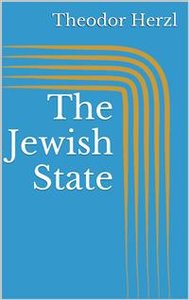"Der Judenstaat" (German, literally "The Jew State", commonly translated as "The Jewish State") is a pamphlet written by Theodor Herzl and published in February 1896 in Leipzig and Vienna by M. Breitenstein's Verlags-Buchhandlung. It is subtitled with "Versuch einer modernen Lösung der Judenfrage", "Proposal of a modern solution for the Jewish question", and originally called "Address to the Rothschilds" referring to the Rothschild family banking dynasty.It is considered one of the most important texts of early Zionism. As expressed in this book, Herzl envisioned the founding of a future independent Jewish state during the 20th century. He argued that the best way to avoid antisemitism in Europe was to create this independent Jewish state. Herzl, who had lived as a secular, largely assimilated Jew, was fluent in neither Hebrew nor Yiddish. His lack of contact with Jewish culture and intellectual currents, and his limited contact with Jews less assimilated than he was probably the reason he abandoned fundamental Jewish principles and rekindled Zionism with this text. The book was used to encourage Jews from all across Europe to purchase land in Palestine. In Der Judenstaat, Herzl noted the possibility of a Jewish state in Argentina.Herzl popularized the term "Zionism", which was coined by Nathan Birnbaum. The nationalist movement culminated in the birth of the State of Israel in 1948, though Zionism continues to be connected with political support of the State of Israel.

